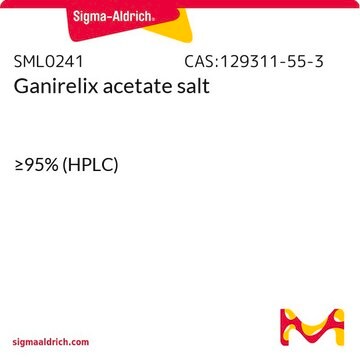C5249
Cetrorelix acetate
≥98% (HPLC)
Synonym(s):
Cetrotide, N-acetyl-3-(2-naphthalenyl)-D-alanyl-4-chloro-D-phenylalanyl-3-(3-pyridinyl)-D-alanyl-L-seryl-L-tyrosyl-N5-(aminocarbonyl)-D-ornithyl-L-leucyl-L-arginyl-L-prolyl-D-alaninamide acetic acid salt, NS-75A, SB-75
About This Item
Recommended Products
Quality Level
Assay
≥98% (HPLC)
form
solid
solubility
methanol: 10%
originator
Merck & Co., Inc., Kenilworth, NJ, U.S.
storage temp.
−20°C
SMILES string
CC(O)=O.CC(C)C[C@H](NC(=O)[C@@H](CCCNC(N)=O)NC(=O)[C@H](Cc1ccc(O)cc1)NC(=O)[C@H](CO)NC(=O)[C@@H](Cc2cccnc2)NC(=O)[C@@H](Cc3ccc(Cl)cc3)NC(=O)[C@@H](Cc4ccc5ccccc5c4)NC(C)=O)C(=O)N[C@@H](CCCNC(N)=N)C(=O)N6CCC[C@H]6C(=O)N[C@H](C)C(N)=O
InChI
1S/C70H92ClN17O14.C2H4O2/c1-39(2)31-52(61(94)82-51(15-9-28-77-69(73)74)68(101)88-30-10-16-58(88)67(100)79-40(3)59(72)92)83-60(93)50(14-8-29-78-70(75)102)81-63(96)54(34-43-20-25-49(91)26-21-43)86-66(99)57(38-89)87-65(98)56(36-45-11-7-27-76-37-45)85-64(97)55(33-42-18-23-48(71)24-19-42)84-62(95)53(80-41(4)90)35-44-17-22-46-12-5-6-13-47(46)32-44;1-2(3)4/h5-7,11-13,17-27,32,37,39-40,50-58,89,91H,8-10,14-16,28-31,33-36,38H2,1-4H3,(H2,72,92)(H,79,100)(H,80,90)(H,81,96)(H,82,94)(H,83,93)(H,84,95)(H,85,97)(H,86,99)(H,87,98)(H4,73,74,77)(H3,75,78,102);1H3,(H,3,4)/t40-,50-,51+,52+,53-,54+,55-,56-,57+,58+;/m1./s1
InChI key
KFEFLCOCAHJBEA-ANRVCLKPSA-N
Gene Information
human ... GNRHR(2798)
Application
Biochem/physiol Actions
Features and Benefits
Signal Word
Danger
Hazard Statements
Precautionary Statements
Hazard Classifications
Repr. 1B
Storage Class Code
6.1C - Combustible acute toxic Cat.3 / toxic compounds or compounds which causing chronic effects
WGK
WGK 3
Flash Point(F)
Not applicable
Flash Point(C)
Not applicable
Certificates of Analysis (COA)
Search for Certificates of Analysis (COA) by entering the products Lot/Batch Number. Lot and Batch Numbers can be found on a product’s label following the words ‘Lot’ or ‘Batch’.
Already Own This Product?
Find documentation for the products that you have recently purchased in the Document Library.
Our team of scientists has experience in all areas of research including Life Science, Material Science, Chemical Synthesis, Chromatography, Analytical and many others.
Contact Technical Service





